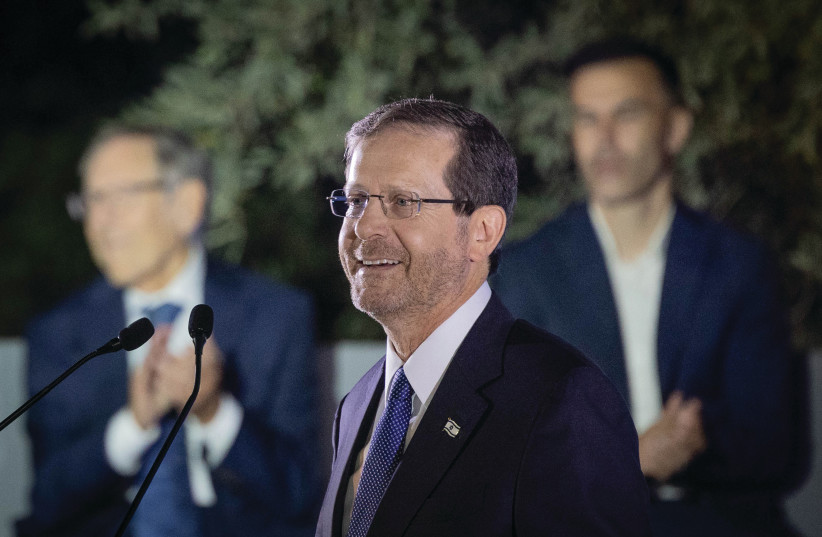I indulged in my favorite temper tantrum of this past year on a Zoom briefing framing the judicial reform debate historically for the leadership of a Northeastern Jewish community.
First the 15 debate participants introduced themselves. They ranged from far Right to far Left, including religious and secular Jews. “How dare you!” I shouted. “You’re defying stereotypes! Everyone tells us the American Jewish community is polarized, that Left never speaks to Right, religious won’t sit with secular. Now, look at you. You’re not just sitting together – but learning together. ‘Shame’ on you!”
I wanted to have a similar temper tantrum last week in Israel about Israel, at the President’s Residence – dare we call it the Blue-and-White House?
President Isaac Herzog awarded the Presidential Medal of Honor to a dozen do-gooders and to Kemach, the organization promoting ultra-Orthodox employment. He hailed these heroes for choosing “to do good, to bring about change, and to make a dramatic contribution to the State of Israel, to the Jewish people, for all humanity.”
The 12 medal-winners ranged in age from 35 to 102.

Most were Israeli, except for the King of Morocco’s Emissary to Israel André Azoulay and my friend – and mentor – Prof. Irwin Cotler, the Canadian human rights trailblazer who helped free Natan Sharansky, Nelson Mandela, and many other dissidents, and served as Canada’s Attorney General and Justice Minister.
Others winners included Chava Alberstein, whose songs provide a unifying soundtrack unconsciously reminding Israel of all we share; Adi Altschuler who founded the “Krembo Wings” youth movement that had my son and many other teens building friendships with kids with special needs; Prof. Meir Buzaglo, whose writings about the Mizrahi experience and the power of tradition don’t deny the scars, but heal us by emphasizing how much we can learn from each other; Rabbi Menachem HaCohen, a Religious Zionist who sees Judaism and Zionism as soul-building and nation-building platforms – not battering rams to smash doubters and outsiders; Natcho Bibras, the Circassian-Israeli-Muslim soccer star who, with an Arab social work professor and a Druze educator, symbolizes Israel’s welcoming democracy; and Lena Stern, whose Yuri Shtern Holistic Centre for Cancer Patients epitomizes how cutting-edge Israel is in treating patients creatively and humanely, not just technologically.
These national treasures each represent different aspects of Israeli society. With over 36,000 non-profits, Israel has one of the world’s most robust civil societies.
Thanking the recipients “for the ray of light that you represent in these difficult days when polarization and division are so prevalent,” Herzog eloquently celebrated the idea essential to his presidency, and our future: “prosperity based on great diversity, but rooted in a common foundation.”
Even when crossing the Red Sea, the children of Israel may have forged “12 separate paths… each tribe in its own path.” But what remained central, Herzog taught, was “the interface between the paths and between the Tribes, the fundamental, infrastructural, unquestionable partnership.”
This partnership of fate and destiny, of what David Hartman called Auschwitz and Sinai, of “connected diversity and partnership,” has “become a Zionist and Israeli ideal” too, Herzog explained.
Leaving the President’s Residence one wanted to shout on the streets “Will the real Israel please stand up!”
Alas, the dyspeptic, dysfunctional, hyper-political Israel has been on display these last few months – delighting our enemies. But just as you can’t judge a book by its cover, you can’t judge a nation by its headlines – or its politics. These impressive award-winners disproved the government lackeys’ demagogic, destructive claim that Israel is an exclusive club only catering to the Ashkenazi elite. These superstars also disproved protest leaders’ hysterical, destructive claims that Israeli democracy is dead or that Israel is an “apartheid” state, by naturally and organically, honoring all types of Israelis: Arabs and Jews, Circassians and Druze.
True, much work remains. But in this coming year, Israelis and friends abroad should look at Israel beyond the fights and stereotypes to see Zionism’s cultural, spiritual, and existential achievements, naturally occurring daily.
Zionist simanim (symbols) for Rosh Hashanah
To deepen our vision, as 94% of Israeli Jews dip apples into honey, demonstrating our togetherness while also doubling Israel’s fish consumption this month, let’s add Zionist simanim (symbols) – to our Rosh HaShanah feasts. Let’s keep the apples and the gourds, leeks, and sweet potatoes that even many Ashkenazim now eat, further proving how Israel has mainstreamed and respected Mizrahi culture. But let’s add other symbolic foods:
- Oranges, so that, in the spirit of the President’s Medals – and the presidential compromise on judicial reform we desperately hope both sides adopt – we appreciate all the sweetness around us, despite occasional pits.
- Passion fruit, to celebrate our distinct personalities and communities swirling around from within, held together by an outer shell of shared values and patriotism.
- Grapes (anavim in Hebrew), in the tradition of symbols based on puns, let us, with enough anava (humility) shrink the grapes of wrath poisoning Israeli discourse.
- Onions, to learn to see the different layers in our opponents’ arguments, even if we disagree.
- Lemons, to honor the Zionist Jew-jitsu, turning lemons into lemonade.
- Sabras, so that we may be prickly toward our enemies on the outside, but sweet to one another on the inside.
- Cherry tomatoes, genetically engineered in the Start-up Nation. Most of the people who stay in Israel do so because we love the cherry tomatoes, the Jewish holidays celebrated nationally, the vibe in the streets, and the communities we develop.
Shanah tovah!
The writer is an American presidential historian, and recently, the editor of the three-volume set, Theodor Herzl: Zionist Writings, the inaugural publication of The Library of the Jewish People.
